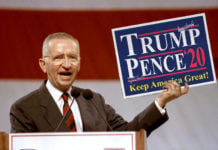The D.C. Circuit Court of Appeals rejected Jill Stein and Gary Johnson’s claims that they were discriminated against during the 2012 & 2016 presidential elections. Yesterday, the court ruled that the duo’s rights were not violated when they were both eliminated from the televised presidential debates in the 2012 and the 2016 elections.
Stein and Johnson argued that their First Amendment rights were violated when they were denied participation in the debates over alleged, “hostility towards their political viewpoints.”
Judge Janice Brown announced her decision and stated, “Every four years, we suffer through the celebration of democracy (and national nightmare) that is a presidential election. And, in the end, one person is selected to occupy our nation’s highest office.” And sarcastically added, “But in every hard-fought presidential election there are losers. And, with quadrennial regularity, those losers turn to the courts.”
It is certainly true that the two erstwhile candidates, “lost millions of dollars’ worth of publicity, campaign contributions, and matching funds that ordinarily would follow participation in the debates.”
The core of their argument – one that the Libertarian Party, especially, has been making for some time – is that the two-party system serves as a monopoly that boxes out credible 3rd party challengers. The high bar needed to participate, at least a 15% in five polls leading up to the debate. However, this constitutes an, “unreasonable burden on free speech or political association” in Stein and Johnson’s eyes.
“None of these allegations articulate a clear legal claim, let alone identify a cognizable injury,” replied Judge Brown as she gave her ruling. “To make matters worse, the complaint omits entirely any allegation of government action, focusing entirely on the actions of the nonprofit defendants.”
“The court also found the alleged harm — lack of media coverage that led to low popularity — preceded their exclusion from the debates,” Brown noted.
The Judge also rejected the two candidates’ claims that their inability to be on the debate stage was an instance of anti-trust violations by the two major parties. “To understand the scope of antitrust standing, we focus on the bedrock principle of this field: antitrust laws protect market (i.e. economic) competition,” Brown declared. “Plaintiffs, however, define their injuries as millions of dollars in free media, campaign donations, and federal matching funds — injuries to them as individual candidates in a political contest for votes.”






























